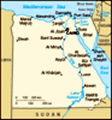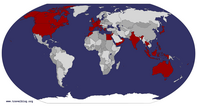Advertisement
Published: February 9th 2019
We set sail from London on P&O's SS Himalaya on 11 September. Mum and Dad had booked the Himalaya because it was the very same ship that they had returned from England on in 1955, with six week old me in tow. Mum was apparently quite sick after my birth, so I never got to go to their home in the London suburb of Roehampton, but instead went with Mum straight from Guy's Hospital to the ship. I was told many times during my childhood that every one of the SS Himalaya's 1955 passengers knew that young Master David Sheehan was on board, as according to Mum I didn't stop screaming from the time we left London until we docked back in Melbourne. This was despite my parents trying to isolate the ship's company from the incessant din by having me "sleep" in an annex beyond their main cabin and away from the corridor. I think they were sincerely hoping that the 1964 rerun was going to be a bit more relaxing and peaceful.
If the Passenger List is anything to go by, it seems that formality was very much the order of the day; titles and honours were greatly

 The Captain's table, SS Himalaya
The Captain's table, SS Himalaya
My parents are on the right, and Mum is sitting next to the Captain (Captain Cowan). I sincerely hope this was "Silly Hat Night".respected, whereas youngsters were considered little more than appendages of their mothers. We were listed as "Sheehan, Major General E.L., C.B.E.", and "Sheehan, Mrs. E.L. & child". It seems that if you were really young, the designation was "infant" rather than "child", but beyond a certain age you got your very own entry as either "Mstr" Bill Smith or "Miss" Mary Jones. I can't find any examples of infants or children travelling accompanied only by their fathers, so presumably the 1960s dad was considered incapable of looking after his offspring for four weeks on a ship. I suppose his options were to leave them at home with the nanny, or wait a few years until they'd graduated to the ranks of "Mstr" or "Miss". The Passenger List doesn't seem to include overly many children, which is probably not too surprising given the strict "P&O - Orient Lines - Arrangements for Children" pamphlet. This included "
When the weather is suitable, special arrangements are made for children's bathing under supervision. We fear that we must ask children to swim only at times when the pool is reserved for them". "We fear"? "They fear" more likely. I hope that by then keel hauling
had been scrubbed from the penalties imposed on any wayward parent who might have dared to allow their youngster a cooling dip whilst adults were in the pool. These were clearly the days before the introduction of privacy provisions. I suspect that if you tried to ask Qantas for a list of passengers on one of its flights these days, they'd assume that you were looking for someone to blow up and you'd quickly find yourself on an Interpol watch list.
Mum and Dad's plans for a laid back cruise suffered a setback soon after boarding when they were dismayed to find that they'd been assigned to the Captain's Table for dinner each night. In those days of respect for titles and honours, they suspected that this might have had more than a little to do with Dad being both a Major General and having had a C.B.E. bestowed upon him. They were looking forward to twenty-eight long nights dining with the Captain and a bunch of stiff-shirted dignitaries like a hole in the head, but to their very pleasant surprise, Captain E. Cowan and their other fellow table mates turned out to be a very relaxed and informal
crew, and dinners became far from the tortuous events that they had first feared. Perhaps the only downside was that the good Captain got to know who I was as well, and happened to quietly mention to Mum and Dad over a lobster one evening that he'd noticed me running in one of the corridors in direct contravention of one of the ship's strictest rules. Mum and Dad were not happy.
I remember the ship approaching Port Said and being accompanied all the way in to the dock by a flotilla of tiny ramshackle boats filled with men trying to sell us things. I'm still not quite sure how they thought they were going to get their wares from their miniscule craft up to the passengers on the decks tens of metres above them, or indeed how money was going to be passed back without sinking to the bottom of the Mediterranean, but I suppose you can't blame them for trying. Dad thought that we ought to go ashore to have a quick look around, but after we'd gone no more than a couple of hundred metres he decided that the whole place looked a bit too intimidating and dangerous, so we quickly hightailed it back to the ship. I think Dad must have figured that the best way of staving off the myriad of gents in flowing robes trying to flog us everything known to man was to actually buy something, which is the only explanation I can come up with for a lot of our photos being housed in a large leather covered photo album with a map of Egypt on the front of it. I'm pretty sure Dad thought that he'd bought a complete album with pages that you could mount photos on inside it, but it turned out that there were only a couple of pieces of thick cardboard inside the cover, put there, I'm sure, to try to make the whole thing look like it was actually filled with something a bit more useful.
We set off from Port Said into the northern part of the Suez Canal at night, and we woke up in the morning to find the Himalaya moored with a lot of other ships in the middle of the very large Great Bitter Lake, midway along the Canal. There didn't seem to be a lot to see, so my young shipboard friends and I decided it would be a good opportunity to view a screening of The Beatles "A Hard Day's Night", which was in the middle of a long run in the Himalaya's theatre. I know that it was a long run, because my mates and I had all been to see it about a dozen times before, to the extent that we all knew the songs and dialogue off by heart. The Fab Four were mid-song when I felt a firm hand grab my arm, and Dad led me not too gently out of the theatre. He wasn't at all happy that I was idly, and for the umpteenth time, watching footage of a bunch of talentless long-haired yahoos prancing around London, while our ship was passing through one of the world's great engineering feats. It seems that ships can only travel at a maximum speed of around 15 kilometres per hour through the Canal to minimise bank erosion. This wasn't enough for me to sense that we were moving as I lounged in the comfort of my theatre seat, so when I got outside I was a bit shocked to see that the landscape was now passing us by. I remember being fascinated by the surroundings - mostly flat featureless sandy desert, with the occasional oasis and camel train to break things up. I'm glad Dad found me in the theatre - he never volunteered how long he spent searching the ship, and I wasn't brave enough to ask. It was a big ship, and judging by how angry he was I suspect that it might have been a fair while. The theatre was also very dark, so he must have been very determined.
Nobody told me at the time, but it seems that in those days the Canal wasn't wide enough for ships going in opposite directions to pass each other, other than in the Great Bitter Lake. Consequently ships went through the two sections of the Canal in convoys. This explained why we had to spend so long in the Lake; it was to wait for the convoy coming from the south to get clear of the southern section of the Canal so that we could sail through it. I assumed that we must have broken down. The Canal was only widened sufficiently to allow free passage of ships in both directions in 2015.
I remember three years later taking a great deal of interest in the events of the 1967 Six Day War, after which the Egyptians closed the Canal to all shipping until 1975 in reaction to the Israelis occupying the Sinai Peninsula along the Canal's entire eastern bank. I remember thinking at the time that we were lucky to have got through the Canal when we did. Fifteen cargo ships that were in it when it was closed weren't so fortunate. I thought that being moored in the Great Bitter Lake for a few hours was bad; these ships were trapped there for eight years. They were all from either Europe or the United States, and became known as the Yellow Fleet as their decks became progressively more covered in sand blown in from the surrounding desert. I read now that the captains and crews of all the ships quickly got together and formed the "Great Bitter Lake Association", with the aim of providing mutual support. They played soccer matches on the decks of the largest ship, arranged life boat races, and even held the Bitter Lake Olympic Games at the same time as the 1968 Mexico Olympics. Movies were played in a cinema on one of the ships, whilst another had a pool that was used by all the crews. Crew numbers were reduced over time, and in 1972 maintenance responsibility was passed to a Norwegian company. At the end of the blockade only two of the ships, both from West Germany, were able to return to their home ports under their own steam. I'm not surprised that I took so much interest in all of this. Three years later and that would have been us......
Advertisement
Tot: 0.07s; Tpl: 0.013s; cc: 17; qc: 32; dbt: 0.0315s; 1; m:domysql w:travelblog (10.17.0.13); sld: 1;
; mem: 1.2mb












Home and Away
Bob Carlsen
Fascinating story about passage of the Panama Canal...
I only sat at the Captain's table as one of twelve passengers on a freighter crossing the Pacific...he was not pleased as I was not wearing a shirt! Earlier I cruised from Singapore to Colombo to Bombay to Karachi to Aden through the Suez Canal to Naples. In the Suez Canal a gully gully man came about to entertain us with a cobra. I was not aware that the Egyptians had closed the canal from 1967 to 1975. You were fortunate not to be trapped.